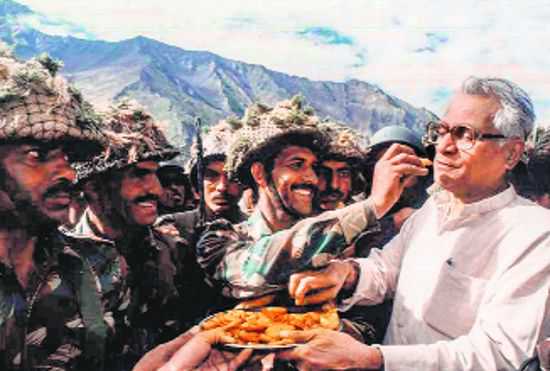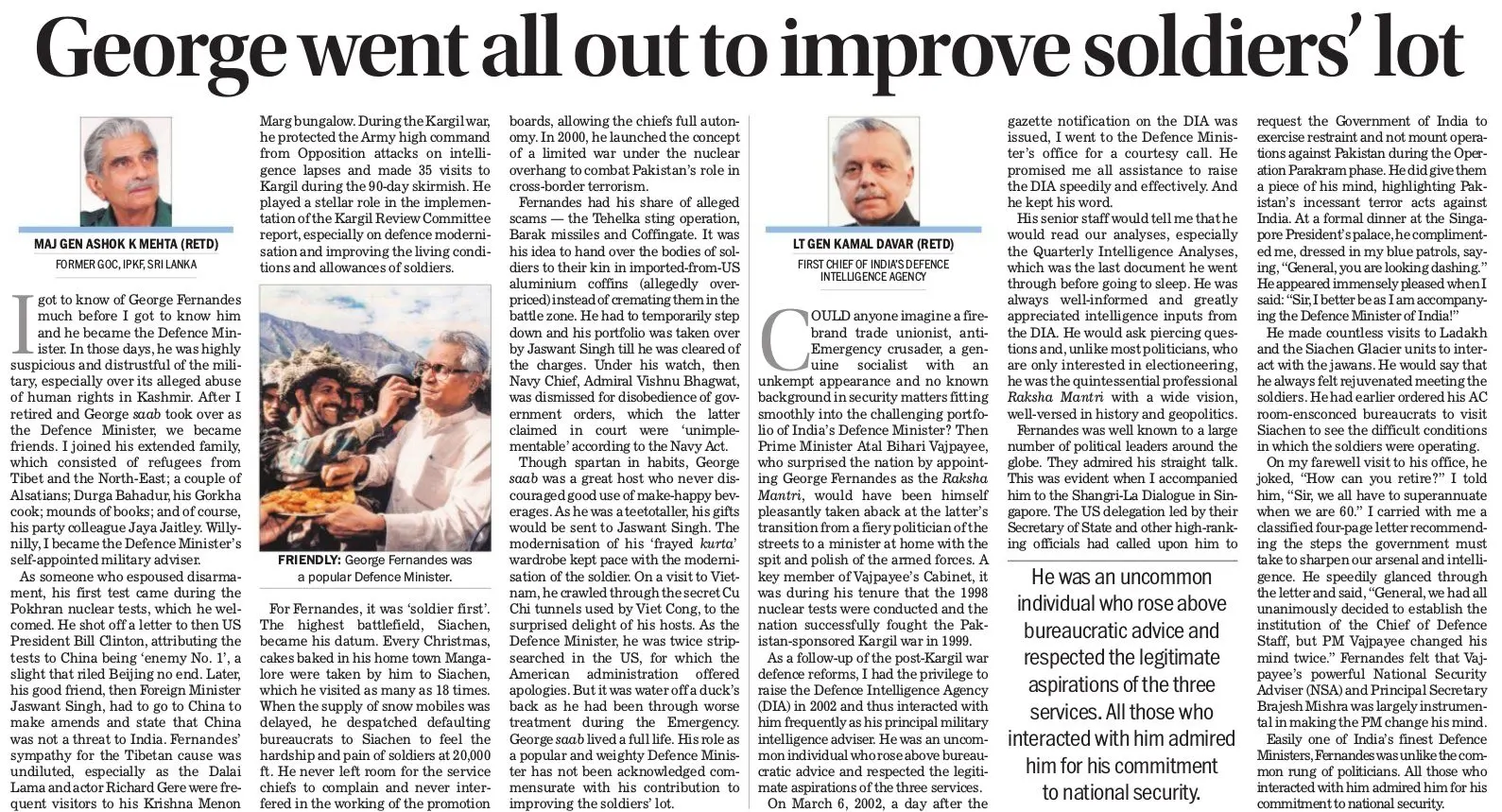
Maj Gen Ashok K Mehta (Retd) & Lt Gen Kamal Davar (retd)

Maj Gen Ashok K Mehta (Retd)
former GoC, IPKF, Sri Lanka
I got to know of George Fernandes much before I got to know him and he became the Defence Minister. In those days, he was highly suspicious and distrustful of the military, especially over its alleged abuse of human rights in Kashmir. After I retired and George saab took over as the Defence Minister, we became friends. I joined his extended family, which consisted of refugees from Tibet and the North-East; a couple of Alsatians; Durga Bahadur, his Gorkha cook; mounds of books; and of course, his party colleague Jaya Jaitley. Willy-nilly, I became the Defence Minister’s self-appointed military adviser.
As someone who espoused disarmament, his first test came during the Pokhran nuclear tests, which he welcomed. He shot off a letter to then US President Bill Clinton, attributing the tests to China being ‘enemy No. 1’, a slight that riled Beijing no end. Later, his good friend, then Foreign Minister Jaswant Singh, had to go to China to make amends and state that China was not a threat to India. Fernandes’ sympathy for the Tibetan cause was undiluted, especially as the Dalai Lama and actor Richard Gere were frequent visitors to his Krishna Menon Marg bungalow. During the Kargil war, he protected the Army high command from Opposition attacks on intelligence lapses and made 35 visits to Kargil during the 90-day skirmish. He played a stellar role in the implementation of the Kargil Review Committee report, especially on defence modernisation and improving the living conditions and allowances of soldiers.
For Fernandes, it was ‘soldier first’. The highest battlefield, Siachen, became his datum. Every Christmas, cakes baked in his home town Mangalore were taken by him to Siachen, which he visited as many as 18 times. When the supply of snow mobiles was delayed, he despatched defaulting bureaucrats to Siachen to feel the hardship and pain of soldiers at 20,000 ft. He never left room for the service chiefs to complain and never interfered in the working of the promotion boards, allowing the chiefs full autonomy. In 2000, he launched the concept of a limited war under the nuclear overhang to combat Pakistan’s role in cross-border terrorism.
Fernandes had his share of alleged scams — the Tehelka sting operation, Barak missiles and Coffingate. It was his idea to hand over the bodies of soldiers to their kin in imported-from-US aluminium coffins (allegedly overpriced) instead of cremating them in the battle zone. He had to temporarily step down and his portfolio was taken over by Jaswant Singh till he was cleared of the charges. Under his watch, then Navy Chief, Admiral Vishnu Bhagwat, was dismissed for disobedience of government orders, which the latter claimed in court were ‘unimplementable’ according to the Navy Act.
Though spartan in habits, George saab was a great host who never discouraged good use of make-happy beverages. As he was a teetotaller, his gifts would be sent to Jaswant Singh. The modernisation of his ‘frayed kurta’ wardrobe kept pace with the modernisation of the soldier. On a visit to Vietnam, he crawled through the secret Cu Chi tunnels used by Viet Cong, to the surprised delight of his hosts. As the Defence Minister, he was twice strip-searched in the US, for which the American administration offered apologies. But it was water off a duck’s back as he had been through worse treatment during the Emergency. George saab lived a full life. His role as a popular and weighty Defence Minister has not been acknowledged commensurate with his contribution to improving the soldiers’ lot.
Lt Gen Kamal Davar (retd)
First chief of India’s Defence Intelligence Agency
Could anyone imagine a firebrand trade unionist, anti-Emergency crusader, a genuine socialist with an unkempt appearance and no known background in security matters fitting smoothly into the challenging portfolio of India’s Defence Minister? Then Prime Minister Atal Bihari Vajpayee, who surprised the nation by appointing George Fernandes as the Raksha Mantri, would have been himself pleasantly taken aback at the latter’s transition from a fiery politician of the streets to a minister at home with the spit and polish of the armed forces. A key member of Vajpayee’s Cabinet, it was during his tenure that the 1998 nuclear tests were conducted and the nation successfully fought the Pakistan-sponsored Kargil war in 1999.
As a follow-up of the post-Kargil war defence reforms, I had the privilege to raise the Defence Intelligence Agency (DIA) in 2002 and thus interacted with him frequently as his principal military intelligence adviser. He was an uncommon individual who rose above bureaucratic advice and respected the legitimate aspirations of the three services.
On March 6, 2002, a day after the gazette notification on the DIA was issued, I went to the Defence Minister’s office for a courtesy call. He promised me all assistance to raise the DIA speedily and effectively. And he kept his word.
His senior staff would tell me that he would read our analyses, especially the Quarterly Intelligence Analyses, which was the last document he went through before going to sleep. He was always well-informed and greatly appreciated intelligence inputs from the DIA. He would ask piercing questions and, unlike most politicians, who are only interested in electioneering, he was the quintessential professional Raksha Mantri with a wide vision, well-versed in history and geopolitics.
Fernandes was well known to a large number of political leaders around the globe. They admired his straight talk. This was evident when I accompanied him to the Shangri-La Dialogue in Singapore. The US delegation led by their Secretary of State and other high-ranking officials had called upon him to request the Government of India to exercise restraint and not mount operations against Pakistan during the Operation Parakram phase. He did give them a piece of his mind, highlighting Pakistan’s incessant terror acts against India. At a formal dinner at the Singapore President’s palace, he complimented me, dressed in my blue patrols, saying, “General, you are looking dashing.” He appeared immensely pleased when I said: “Sir, I better be as I am accompanying the Defence Minister of India!”
He made countless visits to Ladakh and the Siachen Glacier units to interact with the jawans. He would say that he always felt rejuvenated meeting the soldiers. He had earlier ordered his AC room-ensconced bureaucrats to visit Siachen to see the difficult conditions in which the soldiers were operating.
On my farewell visit to his office, he joked, “How can you retire?” I told him, “Sir, we all have to superannuate when we are 60.” I carried with me a classified four-page letter recommending the steps the government must take to sharpen our arsenal and intelligence. He speedily glanced through the letter and said, “General, we had all unanimously decided to establish the institution of the Chief of Defence Staff, but PM Vajpayee changed his mind twice.” Fernandes felt that Vajpayee’s powerful National Security Adviser (NSA) and Principal Secretary Brajesh Mishra was largely instrumental in making the PM change his mind.
Easily one of India’s finest Defence Ministers, Fernandes was unlike the common rung of politicians. All those who interacted with him admired him for his commitment to national security.

